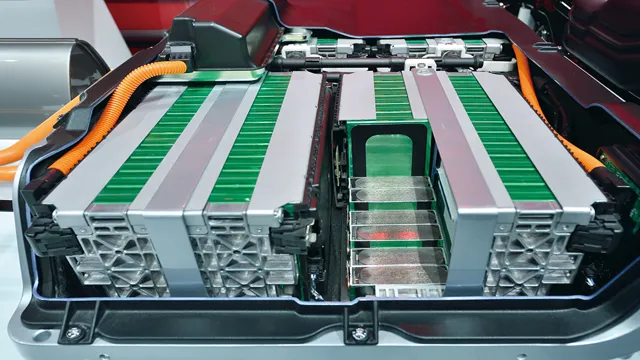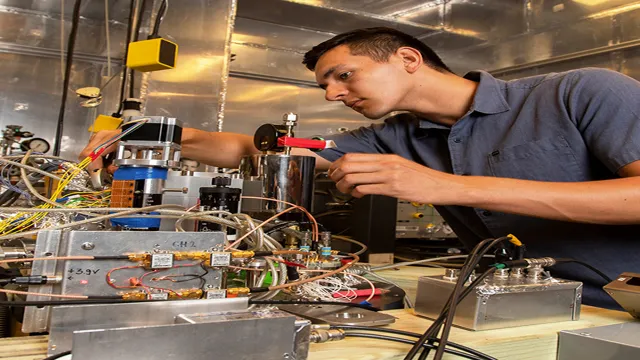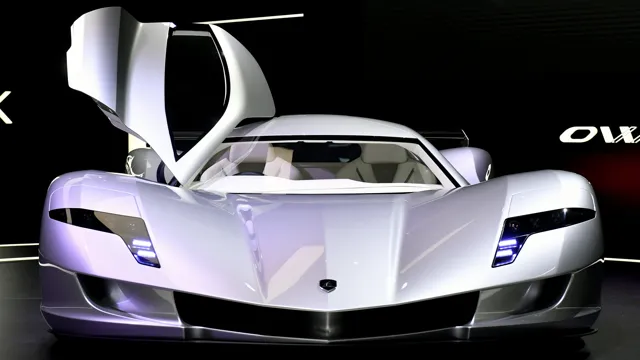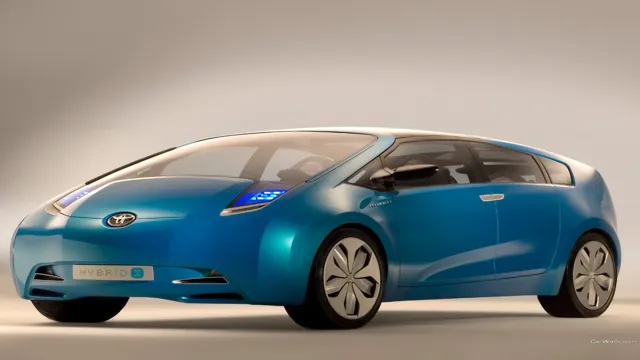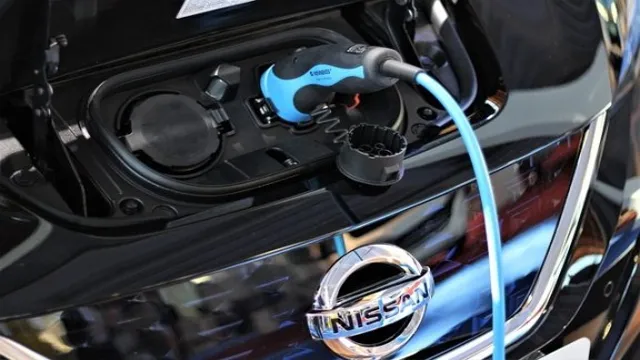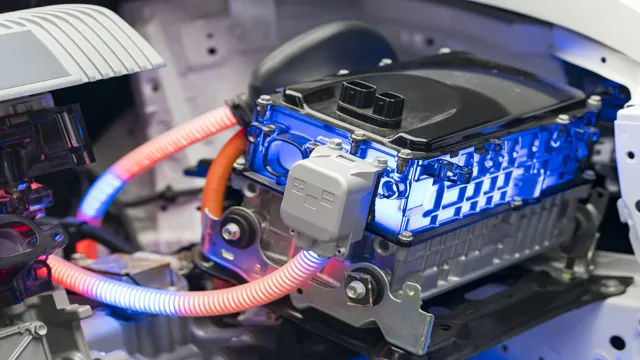Powering the Future: The Advancements and Prospects of Lithium Ion Battery Technology for Electric Cars
Are you tired of short battery life in your electric vehicle? The solution may be in the technology powering the battery itself. Lithium-ion batteries have been the go-to for EVs due to their high energy density and long cycle life. But with the demand for longer driving ranges and quicker charging times, there is a need for improved lithium-ion batteries.
Fortunately, researchers are working on just that. By tinkering with the composition of the battery, such as substituting cobalt with nickel or using silicon instead of graphite, they have made significant progress in increasing energy density and reducing charging time. These improvements can lead to a longer driving range and a shorter wait time at charging stations, making EVs more appealing to the everyday consumer.
But it’s not just about boosting performance. The sustainability of the materials used in the battery’s production is also a crucial factor. Researchers are exploring alternative materials to traditional lithium-ion batteries that are more eco-friendly, such as hydrogen fuel cells.
So, it’s clear that the future is bright for improving EV batteries. With the lithium-ion technology continuously evolving and researchers exploring new and sustainable battery materials, it won’t be long before electric vehicles become the norm and gasoline-powered cars are a thing of the past.
Benefits of Lithium-ion Technology
The improvement of lithium-ion battery technology in electric cars has brought a multitude of benefits. Firstly, these batteries are much more lightweight than their previous counterparts, which means that electric cars can travel significantly further before needing to recharge. This has effectively tackled the issue of ‘range anxiety’ for drivers and made electric cars a viable option for longer journeys.
Additionally, lithium-ion batteries have a much longer lifespan than traditional lead-acid batteries, meaning they can last for several years before needing a replacement. Furthermore, they are much more energy-efficient, meaning that more of the energy stored in the battery can be used for driving, rather than being lost to heat. When considering the environmental impact, lithium-ion batteries are also much cleaner and greener than traditional batteries, as they produce fewer emissions during their manufacture and use.
All in all, the improvement of lithium-ion battery technology in electric cars has made them a more practical, reliable, and environmentally-friendly option for drivers.
Longer Range
Lithium-ion technology has revolutionized the world of batteries, providing us with longer-lasting and more efficient power sources. When it comes to vehicles, the benefits of this technology are clear – longer range and faster charging times. With traditional lead-acid batteries, drivers have to worry about their range and plan their trips accordingly.
But with lithium-ion batteries, drivers can enjoy a longer range, giving them the freedom to explore without having to stop and recharge frequently. Plus, these batteries can be recharged much faster than their lead-acid counterparts, so drivers can get back on the road faster. Additionally, lithium-ion batteries are much lighter than lead-acid batteries, which translates to improved fuel efficiency and reduced emissions.
In short, lithium-ion technology has transformed the way we power our vehicles, making them more efficient, reliable, and eco-friendly.
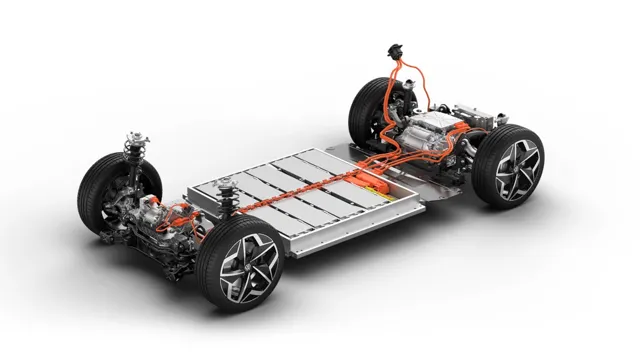
Reduced Weight
Lithium-ion technology has revolutionized the portable electronics industry, thanks to its many benefits. One of the primary advantages is the reduced weight of Lithium-ion batteries compared to traditional batteries. In today’s fast-paced world, people want devices that are lightweight and easy to carry around – whether it’s a phone, laptop or tablet.
With Lithium-ion technology, manufacturers can create devices that are smaller and more lightweight than ever before. This means that you can carry your devices comfortably all day long without experiencing fatigue or discomfort. Lithium-ion batteries also have a higher energy density than their traditional counterparts, which means they can store more energy in a smaller size.
This increased energy density is why you can achieve longer battery life with Lithium-ion batteries over NiMH or alkaline batteries. Overall, Lithium-ion technology has revolutionized the electronics industry, and for good reason. Its improved energy density and lower weight have made our devices more portable, more powerful, and more convenient.
Faster Charging
If you’re tired of waiting hours for your devices to charge, then lithium-ion technology may be just what you need. The benefits of lithium-ion batteries are numerous, and faster charging is one of the most significant. With this technology, you can charge your devices in a fraction of the time it used to take.
It’s perfect for the fast-paced world we live in, where time is of the essence. These batteries have a higher energy density than their predecessors, making them more efficient, and also allowing them to last longer. This means you can use your devices longer on a single charge, without worrying about running out of power.
With lithium-ion batteries, you’ll be able to charge your devices quickly and get back to your busy life in no time.
Current Challenges in EV Batteries
The development of electric cars has been ground-breaking, ushering in a new era of sustainable transportation. As these cars continue to gain popularity, one major challenge remains the improvement of lithium-ion battery technology in electric cars. Although significant progress has been made in recent years in terms of energy density and charging time, there is still a need for further advancement.
One issue is the limited availability of raw materials required in battery production, such as lithium and cobalt, which raises concerns about sustainability. Additionally, the batteries’ weight and size remain a challenge for the automotive industry, which may affect the car’s overall efficiency and performance. Despite these challenges, many researchers and manufacturers are racing to improve EV batteries, with some considering solid-state alternatives that may offer better performance and safety.
With continued innovation and investment in battery technology, the future of electric cars looks bright, and we may soon see longer-lasting, high-performance EVs on our roads.
Costs
One of the biggest challenges currently facing the electric vehicle (EV) industry is the cost of batteries. While battery prices have been decreasing in recent years, they are still a major factor in the overall cost of an EV. This is partly due to the high cost of raw materials such as lithium and cobalt, which are used in the production of batteries.
Additionally, research and development costs for battery technology continue to be a significant expense. However, as more automakers invest in EV technology and battery production becomes more efficient, it is expected that the cost of batteries will continue to decline. In fact, some experts predict that by 2025, the cost of batteries could be as low as $100 per kilowatt-hour, making EVs even more affordable and accessible to consumers.
Despite the current challenges, the future of EV batteries looks promising as advances in technology and economies of scale drive down costs and improve efficiency.
Safety Concerns
Safety Concerns One of the main challenges faced by electric vehicle (EV) manufacturers is the issue of battery safety. Lithium-ion batteries used in EVs pose a risk of thermal runaway, which can result in fires or even explosions. The high energy density of these batteries means that any failure can lead to a significant release of heat and gases, which can cause serious harm to passengers and other road users.
Additionally, the use of flammable electrolytes and the potential for aging or damage exacerbates these risks. Therefore, ensuring the safety of EV batteries is crucial for the wider adoption of sustainable transport. Manufacturers must work to improve the design and construction of batteries to reduce the likelihood of thermal runaway.
This includes the use of advanced materials, temperature control systems, and rigorous testing protocols. Keeping EV batteries safe is a priority for manufacturers and regulators, as it is vital for the future of clean transportation.
Carbon Emissions
Current Challenges in EV Batteries Electric vehicles have been praised as a solution to reducing carbon emissions. However, the batteries that power these vehicles come with their own set of challenges. One of the main issues is range anxiety – the fear of running out of power and being stranded without a charging station nearby.
Another challenge is the high cost of batteries, which leads to a higher price for electric vehicles. In addition, the production of batteries requires a significant amount of resources, including minerals such as lithium and cobalt. As demand for electric vehicles increases, the supply of these minerals may become strained, leading to ethical and environmental concerns.
Despite these challenges, research and development in battery technology is continually improving, leading to more efficient and affordable options for electric vehicle owners.
Future of Lithium-ion Batteries in EVs
The improvement of lithium-ion battery technology in electric cars has been a hot topic for many years. While the current battery technology has come a long way, there is a lot of potential for future advancements that could truly revolutionize the industry. One of the biggest areas of focus for improving lithium-ion batteries in EVs is increasing their energy density.
This would allow for longer range driving and shorter charging times, making electric cars even more convenient and accessible for everyday use. Additionally, advancements in battery chemistry and manufacturing processes could help to reduce the cost of lithium-ion batteries, making electric cars more affordable for consumers. The future of lithium-ion batteries in EVs is bright, and as technology continues to improve, we can expect to see even greater innovation in this field.
Solid-state Batteries
With the rise of electric vehicles (EVs), the demand for lithium-ion batteries is also increasing at an unprecedented rate. However, the present technology used in these batteries has limitations in terms of energy density, charging time, and safety concerns. That’s where solid-state batteries come in.
These batteries promise to resolve the issues concerning safety, energy density, and charging times. They use a solid electrolyte instead of the liquid one used in lithium-ion batteries, making them less prone to explosions. With no liquid component, they can accommodate higher energy density, leading to longer battery life and range for EVs.
Manufacturers are investing significantly in research and development to make solid-state batteries more affordable and suitable for EVs. With these promising developments, it is safe to say that solid-state batteries hold the key to the future of lithium-ion batteries in EVs.
Innovative Anode Design
As electric vehicles (EVs) continue to gain popularity thanks to their environmental friendliness and cost savings for drivers, the need for better lithium-ion batteries also becomes increasingly important. One promising solution that scientists are working on is an innovative anode design that could significantly improve the performance of lithium-ion batteries. Traditionally, anode materials have been made of graphite, but new research has led to the development of silicon-based anodes that offer a higher energy density, meaning that EVs could travel further on a single charge.
However, silicon anodes have a tendency to swell and contract during use, degrading the battery’s performance over time. That’s why researchers are working on novel designs that can accommodate this expansion and contraction, such as using silicon nanowires or carbon-coated silicon particles. With these improvements, lithium-ion batteries could become even more efficient and practical for use in EVs, helping to reduce carbon emissions and promote a cleaner, more sustainable future.
Conclusion
In conclusion, the improvement of lithium-ion battery technology in electric cars has been nothing short of extraordinary. It’s like the battery gods said, “let there be power!” and we answered, “let there be more power!” With each passing year, we’ve seen longer range, faster charging times, and increased reliability. This has paved the way for a future of cleaner, more sustainable transportation.
As we continue to push the limits of battery technology, the possibility of a world where electric vehicles fully replace gas-guzzling cars becomes more and more feasible. It’s time to ditch the pumps and plug in, because the future of driving is electric, and it’s looking brighter than ever.
FAQs
What is the current state of lithium ion battery technology in electric cars?
Lithium ion battery technology has improved significantly in recent years, with higher energy densities and longer lifespans.
How does the improvement of lithium ion battery technology impact the range of electric cars?
With higher energy densities, electric cars can travel further on a single charge, making them more practical for everyday use.
What are some of the limitations of lithium ion batteries in electric cars?
Lithium ion batteries can become less effective in extreme temperatures and have a limited lifespan, which can create issues for long-term use.
What advancements are being made in lithium ion battery technology to improve the efficiency of electric cars?
Researchers are exploring new materials for lithium ion batteries, such as solid-state electrolytes and silicon anodes, which could improve energy storage and charge times.
How does the cost of lithium ion batteries impact the affordability of electric cars?
The cost of lithium ion batteries is a significant factor in the overall cost of electric cars, and manufacturers are working to reduce this cost to make electric cars more accessible to consumers.

